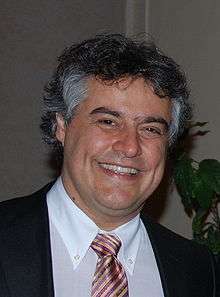2nd Grande Prêmio Cinema Brasil
The 2nd Grande Prêmio Cinema Brasil ceremony, presented by the Ministry of Culture of Brazil, honored the best audiovisual productions of 2000 and took place on February 10, 2001, at the Palácio Quitandinha in the city of Petrópolis, Rio de Janeiro beginning at 8:30 p.m. BRT. During the ceremony, the Ministry of Culture presented the Grande Prêmio Cinema Brasil in 18 categories. The ceremony, televised by TV Cultura and Televisão Educativa, was directed by Bia Lessa and hosted by stylist Felipe Veloso.
| 2nd Grande Prêmio Cinema Brasil | |
|---|---|
| Date | February 10, 2001 |
| Site | Palácio Quitandinha Petrópolis, Rio de Janeiro, Brazil |
| Hosted by | Felipe Veloso |
| Directed by | Bia Lessa |
| Highlights | |
| Best Film | Eu, Tu, Eles |
| Most awards | Eu, Tu, Eles and O Auto da Compadecida (4) |
| Most nominations | Eu, Tu, Eles (10) |
| Television coverage | |
| Network | TV Cultura and Televisão Educativa |
Eu, Tu, Eles and O Auto da Compadecida, each receiving four awards, becoming the most award winners of the ceremony. Other feature film winners included Villa-Lobos – Uma Vida de Paixão and Castelo Rá-Tim-Bum with one award each. Hans Staden was the second film which most received nominations but did not won any award.
Ceremony
The ceremony was held on February 10, 2001, at the Palácio Quitandinha, a former luxury resort hotel in Petrópolis, State of Rio de Janeiro, Brazil, beginning at 8:30 p.m. BRT.[1] Televised by TV Cultura and Televisão Educativa, the ceremony was directed by Bia Lessa and hosted by stylist Felipe Veloso.[1][2] The ceremony started by honoring Sônia Braga, Renato Aragão and Nelson Pereira dos Santos who were hailed by Caetano Veloso, Mangueira members and by former collaborators respectively.[2] It was followed by the awards which were handed by personalities—including singers Marina Lima and MV Bill, philosopher Gerd Bornheim, sprinter Robson Caetano, and journalist Pedro Bial—called onstage by Veloso to make a statement about cinema while the winner was announced on the screen.[2][3]
Winners and nominees
Awards
Winners are listed first and highlighted in boldface.[4][5][note 1]




| Best Film | Best Foreign Language Film |
|---|---|
|
|
| Best Director | Best Screenplay |
|
|
| Best Actor | Best Actress |
|
|
| Best Cinematography | Best Editing |
|
|
| Best Score | Best Release |
|
|
| Best Art Direction | Best Animated Feature |
|
|
| Best Short Film | Best Medium Film[note 2] |
| Best Television Series | Best Television Cultural Production (tie) |
|
|
| Best Video (tie) | Mário Peixoto Award |
|
|
Multiple nominations and awards
|
The following eleven films received multiple nominations.
|
The following two films received multiple awards.
|
Notes
- The sources used here do not include the directors for Best Animated Feature, Best Short Film, Best Medium Film, Best TV Cultural Production, and Best Video. There are individual sources to confirm such information.
- According to Ministry of Culture a "medium" (footage) ("média metragem" in original) film is "one whose duration is longer than fifteen minutes and shorter than or equal to seventy minutes".[9]
References
- "Grande Prêmio Cinema Brasil é Realizado no RJ". Cineclick (in Portuguese). R7. February 10, 2001. Retrieved February 28, 2014.
- Caetano, Maria Rosário (February 12, 2001). "MPB embala festa do 2º Grande Prêmio Cinema Brasil". O Estado de S. Paulo (in Portuguese). Grupo Estado. p. 78. Retrieved February 28, 2014.
- "'Eu Tu Eles' é o grande vencedor do Grande Prêmio Cinema Brasil". Diário do Grande ABC (in Portuguese). February 11, 2001. Retrieved February 28, 2014.
- "Veja os indicados do 2º Grande Prêmio Cinema Brasil". Cineclick (in Portuguese). R7. February 5, 2001. Archived from the original on February 28, 2014. Retrieved February 28, 2014.
- ""Eu Tu Eles" vence "Oscar Brasileiro"". O Estado de S. Paulo (in Portuguese). Grupo Estado. February 11, 2001. Archived from the original on July 9, 2013. Retrieved February 28, 2014.
- "Anima Mundi chega a São Paulo na próxima semana" (in Portuguese). Terra Networks. July 17, 2000. Archived from the original on March 5, 2014. Retrieved February 28, 2014.
- "Canal Brasil premia curtas no Festival do Recife". Folha de S.Paulo (in Portuguese). Grupo Folha. March 30, 2000. Retrieved February 28, 2014.
- "Canal Brasil traz 2 curtas de Otto Guerra". Folha de S.Paulo (in Portuguese). Grupo Folha. January 13, 2007. Archived from the original on February 28, 2014. Retrieved February 28, 2014.
- "Media Provisória nº 2.228-1, de 6 de setembro de 2001" (in Portuguese). Ancine. Archived from the original on December 16, 2007. Retrieved February 28, 2014.
- "Confira os vencedores do 28º Festival de Cinema de Gramado" (in Portuguese). Terra Networks. August 6, 2000. Archived from the original on March 4, 2016. Retrieved February 28, 2014.
- "Confira programação para o 9º Festival de Cinema e Vídeo". Diário de Cuiabá (in Portuguese). September 24, 2001. Retrieved February 28, 2014.
- Chnaiderman, Miriam (September 17, 2000). "Modos de filmar o Brasil". Folha de S.Paulo (in Portuguese). Grupo Folha. Archived from the original on February 28, 2014. Retrieved February 28, 2014.
- Sampaio, João Carlos (July 31, 2013). "O cinema dos oprimidos de Camilo Cavalcanti". Revista de Cinema. Universo Online. Archived from the original on March 5, 2014.
- A series of five episodes which, four of which were directed by Gomes and one by Barcinski as in the following sources:
"Os Brasileiros 5 x 26′ De Marcelo Gomes" (in Portuguese). Synapse Produções. Archived from the original on February 28, 2014. Retrieved February 28, 2014.
"Os Brasileiros – Índios" (in Portuguese). Televisión América Latina. Archived from the original on February 28, 2014. Retrieved February 28, 2014.
"Os Brasileiros – Africanos" (in Portuguese). Televisión América Latina. Archived from the original on February 28, 2014. Retrieved February 28, 2014.
"Os Brasileiros – Mestiço" (in Portuguese). Televisión América Latina. Archived from the original on February 28, 2014. Retrieved February 28, 2014.
"Os Brasileiros – Portugueses" (in Portuguese). Televisión América Latina. Archived from the original on February 28, 2014. Retrieved February 28, 2014.
"Os Brasileiros – Esse Nossot Matulão" (in Portuguese). Televisión América Latina. Archived from the original on February 28, 2014. Retrieved February 28, 2014.
- Zwetsch, Ramiro. "Música do Brasil". IstoÉ Gente (in Portuguese). Editora Três. Archived from the original on July 6, 2013. Retrieved February 28, 2014.
- "Filmes lançados entre 1995 e 2004 por ano e por público" (PDF) (in Portuguese). Ancine. Archived (PDF) from the original on February 28, 2014. Retrieved February 28, 2014.
- "O Povo Brasileiro" (in Portuguese). Superfilmes. Archived from the original on November 30, 2001. Retrieved February 28, 2014.
- "Timor, a reconstrução de um país nas telas". O Estado de S. Paulo (in Portuguese). Grupo Estado. August 18, 2000. Archived from the original on February 28, 2014. Retrieved February 28, 2014.
- "feitoamãos/F.A.Q – Entrevista" (in Portuguese). Sesc. Archived from the original on March 5, 2014. Retrieved February 28, 2014.
- "Marcelo Yuka do Rappa fala do 6.º VMB". O Estado de S. Paulo (in Portuguese). Grupo Estado. August 11, 2000. Retrieved February 28, 2014.
- "Nuno Ramos: Acidente Geográfico – Eder Santos – Investigações: O Trabalho do Artista (2000)" (in Portuguese). Itaú Cultural. Archived from the original on March 1, 2014. Retrieved February 28, 2014.
- "Documentário celebra criatividade de Henfil". O Estado de S. Paulo (in Portuguese). Grupo Estado. August 6, 2000. Archived from the original on February 28, 2014. Retrieved February 28, 2014.
- Antenore, Armando (October 26, 2001). ""O Fim do sem Fim" reúne pessoas em ofícios à beira da inexistência". Folha de S.Paulo (in Portuguese). Grupo Folha. Retrieved February 28, 2014.